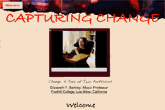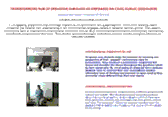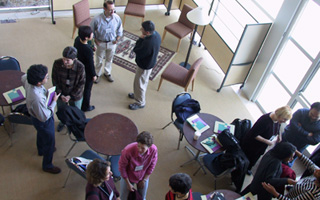 Collections
Collections  CASTL Higher Ed.
CASTL Higher Ed. | CASTL Higher Education |
The Carnegie Academy for the Scholarship of Teaching and Learning in Higher EducationWelcome to the CASTL Higher Education Collection. This collection presents the efforts of over 15 CASTL Scholars to render their teaching public. The authors of the sites are faculty members from different institutions and of various disciplines; each of whom turned a scholarly eye upon their teaching and generously shared representations of these efforts here, for others to engage. The sites in this collection include hand-built faculty teaching portfolios and scholarship of teaching and learning (SoTL) projects that were created over a period of eight years. They display the inquiry, processes, and reflections of faculty from disciplines including (but not limited to) mathematics, psychology, and music. At the same time, they reveal some unique ways of representing individual faculty investigations of teaching, collaborative inquiry, and disciplinary and interdisciplinary teaching and learning. |
 Capturing Change: A Tale of Two Portfolios
Capturing Change: A Tale of Two Portfolios
These two portfolios document efforts to capture change
in a single general education music course. The first analyses the
course's transformation from a catastrophe to a cause for celebration;
the second explores the search for deep learning.
Created: 2006-11-08
 Advanced Mathematics for Secondary Teachers: Course Portfolio
Advanced Mathematics for Secondary Teachers: Course Portfolio
The course the portfolio describes is a capstone course
in mathematics primarily aimed at future high school mathematics
teachers. Bennett decided to write a course portfolio for this course as
a way to pass the course along to other faculty members that will teach
it in the future. Thus, the central purpose of this portfolio is to be a
course record, suitable for other faculty members in the department to
use as the main resource when they teach the course.
Created: 2003-01-01
 Learning Interdisciplinarity: A Course Portfolio
Learning Interdisciplinarity: A Course Portfolio
Linkon's research focused on evaluating the
effectiveness of her incremental learning assignments in an
interdisciplinary course. She gathered a variety of kinds of evidence of
students' learning, ranging from surveys and interviews to students'
projects and her own reflections. The three-assignment incremental
learning sequence worked well for most students. Linkon's analysis of
their work showed a clear development of analytical complexity in their
writing over the course of the term. Students also noted that the
sequence helped them gain confidence and understanding. The website is
framed around a series of key questions:
* How does interdisciplinary teaching and learning work?
* What do I want students to learn?
* How can I facilitate their learning?
* How would I know if it worked?
* How did it go?
Created: 2002-01-01
 Transforming Public Speaking Through an Emphasis on Civil Public Discourse
Transforming Public Speaking Through an Emphasis on Civil Public Discourse
A professor investigates her teaching efficacy by tracking her students' development in a public speaking course.
Created: 2002-01-01
 Peer Review of Teaching - Course Portfolio
Peer Review of Teaching - Course Portfolio
In this course portfolio, Dan Bernstein reports on
changes he has made over three semesters in a psychology course on
learning. He has succeeded in getting more students to achieve higher
levels of understanding by changing the assessment from short abstract
essay questions to problems that asked students to apply concepts in new
contexts, and providing web-based opportunities for students to
identify what makes some answers better than others. The portfolio
includes examples of the assessments used, graphs reporting his results,
and students final exams.
This work is part of an exhibition on Disciplinary Styles in the
Scholarship of Teaching. The project shows how Bernstein makes use of
ideas about levels of understanding derived from his own discipline, but
not always applied in pedagogical practice. Similarly, he presents his
work using the graphs and statistics drawn from his background as an
experimental psychologist, but has to rely on the quasi-experimental
methods more comfortable for his colleagues in other sectors of
psychology.
Created: 2002-01-01
 Calculus Conversations: Making Student Thinking Visible
Calculus Conversations: Making Student Thinking Visible
The difficulty that many calculus students face is
their inability to apply methods and concepts used in practiced problems
to new situations. This is not only a cause for concern in their
calculus courses but also in subsequent science and engineering courses
where they need to use the fundamental principles and methods of
calculus. This project began as an attempt to create a course activity
that would help students improve their ability to transfer their
knowledge across application domains. In the end, Salem and Michael were
unable to determine how effective the activity was in addressing the
problem of transfer. However, they were able to formulate a simple but
useful characterization of students' approaches to solving
out-of-context problems.
Created: 2001-03-01
 Overview of a Course on Current Approaches to Teaching, Learning, and School Improvement
Overview of a Course on Current Approaches to Teaching, Learning, and School Improvement
This website was designed as an archive of course
materials and reflections to serve as a foundation for the development
of future versions of this and other courses. The course syllabus serves
as the organizing structure of the site; it provides access to weekly
reflections, class overheads and notes, and student work.
Created: 2001-01-01
 Western Civilization Course Portfolio
Western Civilization Course Portfolio
This portfolio documents the teaching in a Western
Civilization survey course at Texas Tech that took a thematic approach
to investigate a number of the most important developments from the 17th
Century to the Fall of Communism. The portfolio focuses on the impact
of hypermedia on student learning and includes samples of student work,
student evaluations, and peer comments.
Created: 2001-01-01
 Making Sense of Complementary and Alternative Medicine: Analysis of a Family Nurse Practitioner Program
Making Sense of Complementary and Alternative Medicine: Analysis of a Family Nurse Practitioner Program
The overall goal of this inquiry project was to
evaluate approaches to incorporating complementary and alternative
medicine into the curricula of nurse practitioner (NP) programs.
Specifically, Burman undertook a comprehensive assessment of how the
concept of complementary and alternative therapies is (or is not)
addressed in her FNP curriculum. The outcome of this assessment is a
"curriculum component portfolio" with selected pieces of evidence,
critical reflection and recommendations.
Created: 2001-01-01
 An Alternative Approach to General Chemistry: Addressing the Needs of At-Risk Students with Cooperative Learning Strategies
An Alternative Approach to General Chemistry: Addressing the Needs of At-Risk Students with Cooperative Learning Strategies
This site presents a study on the impact of
incorporating cooperative learning activities in a large section
(>200 'at-risk' students) of General Chemistry. It includes data
documenting students' performance in the course and in more advanced
science courses, course materials, and videotapes illustrating
cooperative problem solving in small groups. Jacobs' website provides
graphic representations of his results, a site library with access to
his methods and analyses and video clips showing students at work allows
him to juxtapose powerful graphic representations of his course
transformation with video clips showing students at work.
Created: 2001-01-01
 Making a New Song About Science
Making a New Song About Science
This website shows how Smith fostered the development
of her students' competence and confidence in teaching science through a
course for preservice teachers at Michigan State University. Smith's
site is laid out in a timeline that allows visitors to access documents
from her syllabus, student work samples, and audio commentary on her
students' development.
Created: 2001-01-01
 Learning From Cases
Learning From Cases
This site focuses on the use of case writing to support
student learning in a Foundations of Learning course for pre-service
teachers at the graduate level. It uses a course timeline to organize
links that show course materials, the development of one student's case,
and student and instructor reflections. The site index also includes an
archive of students' cases, as well as a collection of other course
materials.
Created: 2000-01-01
 Learning to Think Mathematically
Learning to Think Mathematically
Concerned that most students leave college thinking of
mathematics as a fixed body of knowledge to be memorized, Cooperstein
designed a new course to help students learn to think mathematically for
themselves. This website serves as a course portfolio that documents
the new class, Introduction to Mathematical Problem Solving. The
principal activity in the class involved students working on and
discussing novel problems which required them to formulate experiments,
work out cases, look for patterns in data, pose questions, make
conjectures, search for counterexamples and attempt to prove their
assertions. Cooperstein has collected a vast array of student work
samples and has annotated them extensively with his own commentary.
Created: 2000-01-01
 Revealing Student Understanding in a Problem-Based Educational Psychology Course
Revealing Student Understanding in a Problem-Based Educational Psychology Course
This "class anatomy" includes the full documentation of
one of the problems on the application of a technique for teaching
reading as well as some video excerpts from the class, and analyses of
the development of students' understanding. It represents the first
attempt of a Carnegie Scholar and KML staff to produce a multi-media
website. This site was revised in 2004 to emphasize the multimedia
components of Cerbin's work from an original course portfolio which is
located at http://gallery.carnegiefoundation.org/bcerbin/.
Created: 1998-01-01
